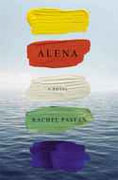Alena
Rachel Pastan
book reviews:
· general fiction
· chick lit/romance
· sci-fi/fantasy
· graphic novels
· nonfiction
· audio books
· author interviews
· children's books @
curledupkids.com
· DVD reviews @
curledupdvd.com
newsletter
win books
buy online
links
home
for authors
& publishers
for reviewers

 |
Alena Rachel Pastan Riverhead Hardcover 320 pages January 2014 |
|
Channeling Daphne Du Maurier’s Rebecca, Pastan’s fabulous novel follows debasement and ambition, plunging us into the looking-glass world of contemporary art. In prose that is both poetic and elegiac, Pastan’s unnamed curator starts her journey working in the art department of a second-rate Midwestern college presided over by a woman called Louise. Overnight, Louise decides to take her to Venice for the Biennale. It is here that she meets wealthy Bernard Augustin, the owner of the Nauk—an exclusive and prestigious contemporary art museum that sits on the edge of Nauquasset, Cape Cod.
“Neurotically devoted to art like a novice nun to God” and longing for a world so much bigger and stranger than she could ever have expected, she jumps at the opportunity and returns with Bernard to the Cape. Plunging into the quixotic world of this strange, mercurial man with his wrinkled tuxedo and drizzled hair, she’s blissfully unaware of Bernard’s mysterious loss: that of Alena, his once-glamorous employee and colleague. Missing for just over two years, Alena is presumed dead. No one knows quite what happened to her, only that she liked to swim alone at night. Although her body never washed up, Bernard maintains it was a tragic accident, this beloved friend who disappeared and never made it to Venice. Thus begins our narrator’s series of rash decisions as she begins to organize her first exhibition in the mysterious Nauk, a world of controversial installations and flashy, self-conscious artists who seem temperamental at worst and talented at best: “Somehow I had slipped out of my life into a new quixotic dimension. I was Dorothy awakened after the cyclone into Technicolor.” Almost at once she finds this dimension and desire conflicting with sudden inspiration, the consequences of her reaction to Alena’s vanishing putting her at odds with the Nauk’s long-term staff and threatening the precarious balance of the old and the new. She can’t do anything without the help that is always given “condescendingly and with such a calibrated disdain.” Sitting behind her expensive Vaarni desk, she daily fields icy stares from Agnes, the Nauk’s officious administrative assistant. Her blood-red earrings sparkling, Agnes seems to “grow too large and too cold.” Office secretary Sloan, with her “white boots and bubblegum scent,” wields a negative attitude every chance she can get, while handsome assistant Jake tells of the ghost of Maria Hallett. Rumored to be an eighteenth-century witch, Maria is thought to live in a cabin on the beach “where the bodies wash up.” Only the clear blue gaze of local cop Chris Passoa can counterbalance “the sour taste of anxiety” on our narrator’s tongue. Dimly aware of chaotic, exhausting dreams, she spends her mornings heading up to the chilly, humidity-controlled office of the Nauk, unnerved by the surprising number of locked doors through which entry is controlled by Agnes, who clanks around the gallery like some sort of “Victorian ghost.“ Every action, every word, and every thought recalls Alena and her life of swimming and beaches, exhibitions and parties. She wonders how long until her own bodily presence will have half the substance of her predecessor’s absence. From this literal tragedy comes a wide-ranging meditation on the nature of obsession and the art world with its celebrities, super-rich collectors and hangers-on, where “everybody is trying to look more successful than they are,” Pastan’s gorgeous novel is always compelling and her prose colorful but distant like Alena, whose ethereal, spectral presence barely breaks from the direction our restless narrator has embraced until the end of the novel. The call of the ocean resounds throughout, coming forward and falling back, always clamoring for the shore but unable to possess it. Like a ghost whose arms drift through a loved one’s body, the ocean reflects Bernard’s own restless and dramatic tug of grief, of acceptance, of letting go, and of the Nauk itself, always ready and arranged “like a bridegroom” waiting for Alena to return. Originally published on Curled Up With A Good Book at www.curledup.com. © Michael Leonard, 2014 |
| Also by Rachel Pastan: |
|
|
|
 Click here to learn more about this month's sponsor! |
|
| fiction · sf/f · comic books · nonfiction · audio newsletter · free book contest · buy books online review index · links · · authors & publishers reviewers |
|
| site by ELBO Computing Resources, Inc. | |
 A moment in time coils like a spring. Present and past, dream and reality come together in strange angular shapes. For all her naivety and idealistic anxiety, our narrator is conflicted by the urgency to stay with Louise and maintain the facade of normalcy she has assumed would be her lot in life. Caught in a conundrum, her position is further exacerbated when Bernard invites her to come to Nauquasset and run the Nauk, (“this long shingled building with its great windows facing the sea,”), in what is quite probably the most important job of her life.
A moment in time coils like a spring. Present and past, dream and reality come together in strange angular shapes. For all her naivety and idealistic anxiety, our narrator is conflicted by the urgency to stay with Louise and maintain the facade of normalcy she has assumed would be her lot in life. Caught in a conundrum, her position is further exacerbated when Bernard invites her to come to Nauquasset and run the Nauk, (“this long shingled building with its great windows facing the sea,”), in what is quite probably the most important job of her life.